The Sun Yet Shines
Reflections on the Season 2 finale of The Lord of the Rings: The Rings of Power

“The night would swallow everything...and in the end the last little flame would flicker out, leaving no more than a wisp of gray smoke to curl away unseen...But...the final end would not be darkness. Somewhere, far beyond the night, there would be a brighter and a stronger light.”—Bruce Catton, This Hallowed Ground: The Story of the Union Side of the Civil War, p. 400
When first I read that quote from Bruce Catton back…last November, I think it was, my thoughts turned almost immediately to Galadriel (Morfydd Clark) and her arc as it concluded in the Season 1 finale of Rings of Power. As I’ve written about in the past and still strongly believe, it was a story of defeat mingled with triumph, for although her crusade against Sauron (Charlie Vickers) backfired rather spectacularly, she was still able to save her own soul and pledge to continue the struggle, this time with a new focus (never absent but often taking second place) on others; she touched the darkness yet still found the light. But that was then; she had a whole new journey in the just-completed Second Season. And in the course of this journey she experienced a hard truth that Nicholas Woodson’s old man told Sauron-as-Halbrand in this season’s premiere: being good is not a one-time-thing, but requires you to actively make the choice to be good every day. Galadriel, and other characters, making various choices in response to Sauron having made his towards the end of Season 1 forms the central conflict of Season 2, which came to its triumphant conclusion on October 3rd. Well, triumphant from a certain point of view. Much like the rest of the season, there was darkness and tragedy aplenty. We saw a kingdom finally destroyed, another one plunging deeper into darkness; numerous important people died, as this episode had the highest butcher’s bill in a season that already had a high kill-count, and Sauron continues his rise to power and his quest to swallow all the world in darkness and call it healing. And yet, that quote from Catton still applies: to Galadriel’s arc in Season 2, to the season as a whole, and to its finale.
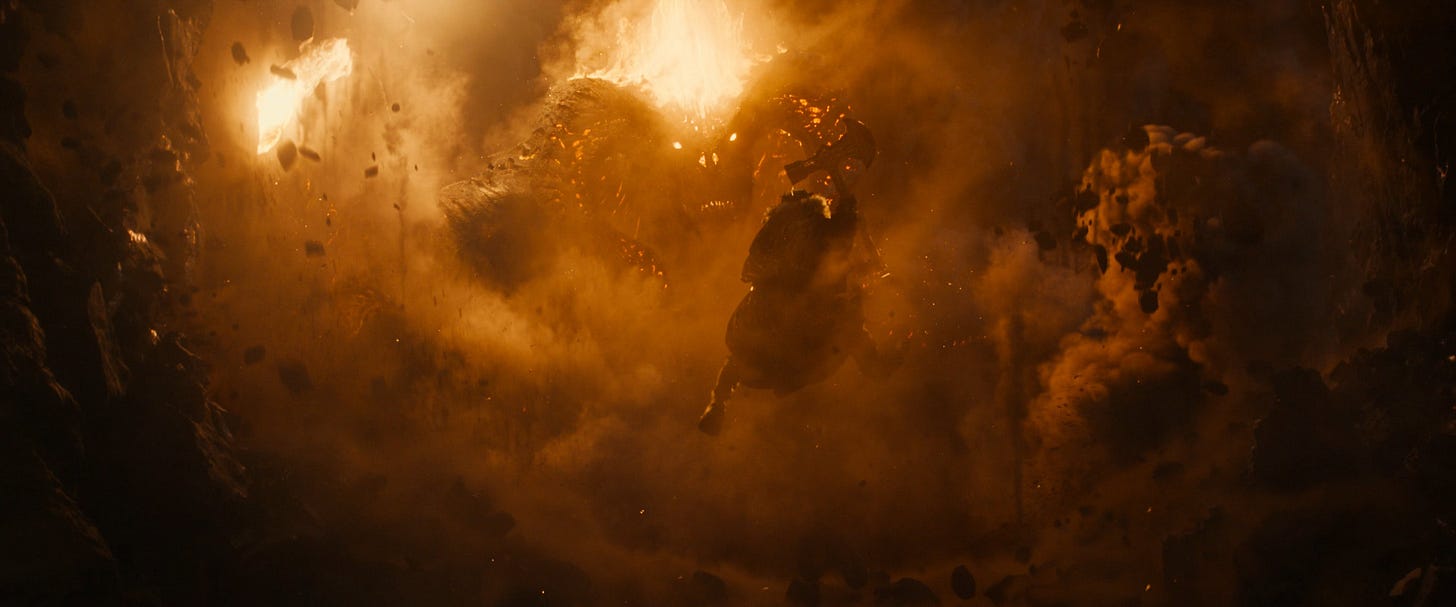
The opening act of the episode set the tone, as all of these factors came into play. Having learned that his father (Peter Mullan) has gone completely mad, Prince Durin (Owain Arthur) comes barreling down to the newest dig sight to try and stop him before catastrophe strikes; Disa (Sophia Nomvete) is thankfully still alive and caring for the other miners, but the king is deep in the mine and banging away with a ram. At first, the prince threatens to cut off the king’s ring-hand if he won’t take it off, but as his father turns to him Durin softens, hearkens back to the strong example the king had shown him as a wee lad, and begs him to remember the better angels of his nature. At first it looks like King Durin’s heart is too hard, since he turns back and breaks down the last wall between them and a vast labyrinth of caverns with mithril bleeding from the walls. But interestingly, he offers to share with his son the power of the Ring. It’s a good start, because at long last the Balrog chooses to make his appearance, a terrifying monster of the Elder Days with a flaming sword and whip and wings of shadow.1 And it is in this moment of ultimate adversity that finally, the light pierces King Durin’s hard heart and he is truly strong again; he takes off the ring, asks forgiveness of Prince Durin, abdicates in his favor, and hurls himself at the Balrog. He loses his life, of course, but he saves his soul, and the mine collapsing behind him saves the rest of the kingdom. Prince Durin will grieve, but at least he has a kingdom still, and the Dwarvish army can finally set out for Eregion.
The questions of royal power that King Durin’s death open up are very much on the minds of the Numenoreans in this last episode. The last time we saw them, Pharazon (Trystan Gravelle) was still the king, but in the aftermath of his failed attempt to neutralize Elendil (Lloyd Own) with a trial by ordeal, a large number of the people were starting to remember the true queen, Miriel (Cynthia Addai-Robinson); civil war was looming, even as Pharazon himself was resorting to looking into the Palantir seeking guidance and getting visions of Halbrand instead. The situation requires patience and tact; perhaps a political marriage with Miriel to unite the factions? Instead, Pharazon decides to throw oil into a boiling pot of water, using troops and misinformation to secure his power by essentially purging the Faithful as secret allies of Sauron. Meanwhile Numenor must expand and militarize to face the rising threat, and Kemen (Leon Walham) arrives in Pelargir as the extremely punchable face of resurgent Numenorean imperialism, to reestablish the colony as an armed garrison and naval shipyard. And Isildur (Maxim Baldry), who was literally just about to get somewhere with Estrid (Nia Towle) learns the hard truth that sometimes duty is the death of love. Deeply concerned about what’s happening in Numenor, probably unable to stand Kemen for more than a few seconds, and still looking for something “singular” to do that’ll show his mother didn’t die in vain to rescue him, he departs for home, going back into the fire.
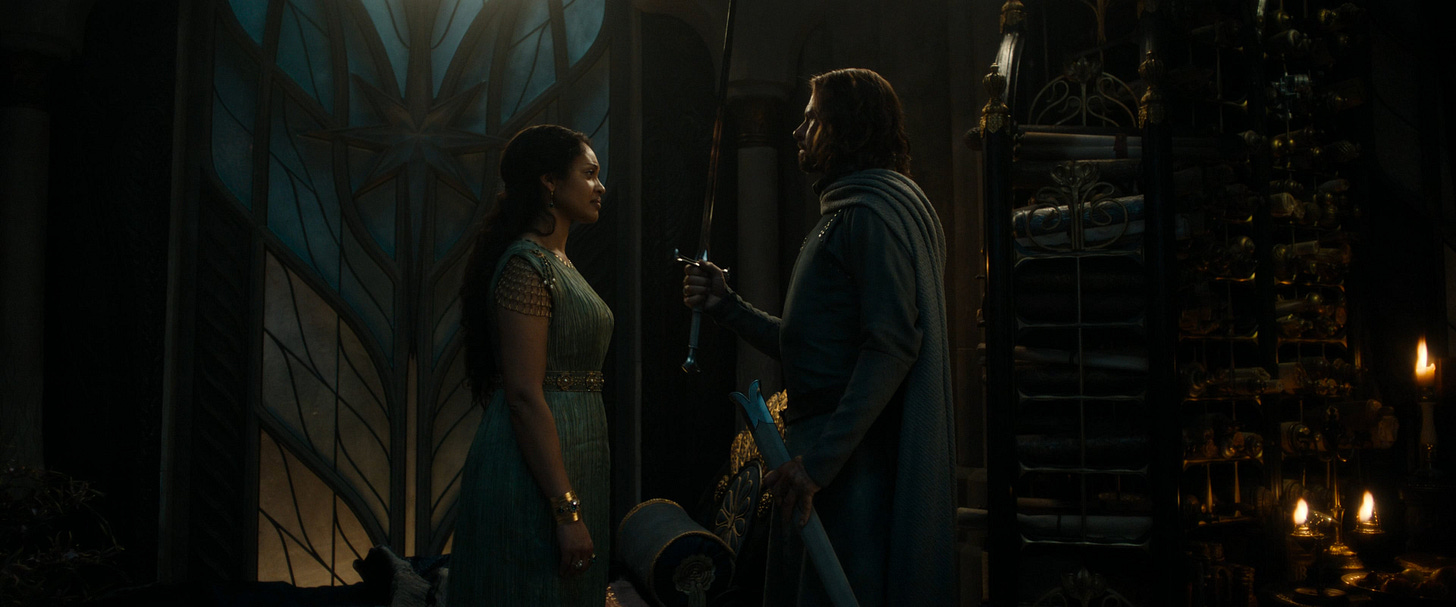
Back in Armenelos, amidst the chaos of the purge Earien (Ema Horvath), whose conscience has gotten a new lease on life, is able to warn her father that the soldiers are coming, and when they do come she does her best Obi-Wan Kenobi to buy him some time. Being the good knight that he is, Elendil makes a beeline for the palace, getting through some incredibly lax security to try and extract Miriel to safety in the West, where the Faithful are still strong—including his second son Anarion2. But she opts to stay at her post “come what may”; this is going to be rough, since one of the last scenes of the episode is her in chains on trial for treason. But this time, Elendil is given a new mission: to ride into the West, reclaim his lordship (he is rightfully the Lord of Andunie, one of the princes of the blood), and his destiny. And as a parting gift, he receives a new sword to replace the one he gave up in Episode 5: none other than Narsil, the “White Flame”, and a holy relic of the Elder Days.3 “Come what may” Miriel’s star, that had shone so brightly in Episode 6, is on its way out, and she is at peace with it; “come what may” Elendil’s is on the rise as he continues his journey to become King of the Faithful, and to restore his shattered family by reuniting with the first child that he lost.
Separations and new journeys also form a big part of the Rhun story, where we meet the Stranger (Daniel Weyman) having chosen to rescue his halfling friends instead of trying to find a spare stick in a forest of deadwood. He (and us) get rather confused somewhat quickly; not so much by the presence of the Dark Wizard (Ciaran Hinds) and his mercenaries holding Nori and Poppy hostage, but by the fact that said Dark Wizard is claiming that he is opposed to Sauron. So…what was all the rigmarole with the Three Mystics initially worshipping the Stranger as Sauron in Season 1? And why do the Easterling mercenaries ride with banners depicting the eye? While we ponder these questions, the Dark Wizard assures our friend that they are of the same class and race and both came to Middle-earth to oppose Sauron; but when he abruptly kills one of the Easterlings holding Nori and Poppy, any progress he might have been making suddenly dries up as the Stoors look on him with fear, the Harfoots with pity for their fallen enemy, and the Stranger with suspicion and righteous anger. Going nowhere by talking about the ends justifying the means, the Dark Wizard opts instead to level the village with rockslide and depart, hoping that will show the Stranger will “come to his senses” and join him later.
Instead, by literally tapping into the Power of Friendship, the Stranger is finally able to use his powers productively without chaos resulting, and everyone in the village survives. The next morning, when things are calmer, Nori is distraught and suggests trying to help the Stoors rebuild, even though the damage is total. At which point Poppy steps up with a beautiful monologue that was first taught her by Sadoc Burrows, about how no matter how much some things matter and how much it hurts to lose them, sometimes “What’s broke is broke, and won’t fix”, and your only option is to build something new. And that’s what the Stoors decide to do, following in the footsteps of old Rorimas Burrows centuries ago and migrating into the west and out of the arid steppes of Rhun. It being their first migration and all, Nori and Poppy both decide to go with them, the latter because now there’s no threat of death to stop her from progressing in her relationship with Merimac (Gavi Singh Chera). It’s a hard parting, but Nori has done what she set out to do, help the Stranger find his destiny. Now he has a name, Gandalf (derived from how all the Stoors call him “Grand-elf”)4, a staff, and a sense of his mission. But first, to call upon Tom Bombadil (Rory Kinnear) and give him a bit of a scolding for all the emotional distress the choice between friendship and power caused. But Tom’s native good nature, bolstered by his relief that Gandalf made the right call, is enough to soften the wizard’s mood, and soon the two are drinking tea and singing like old friends.
So much loss, separation, uncertainty, hope and new beginnings. And we have only been talking so far about the various “B” storylines. It’s high time we tied everything back together by checking in on what’s been going on in Eregion, where things were quite grim when last we saw them in Episode 7.
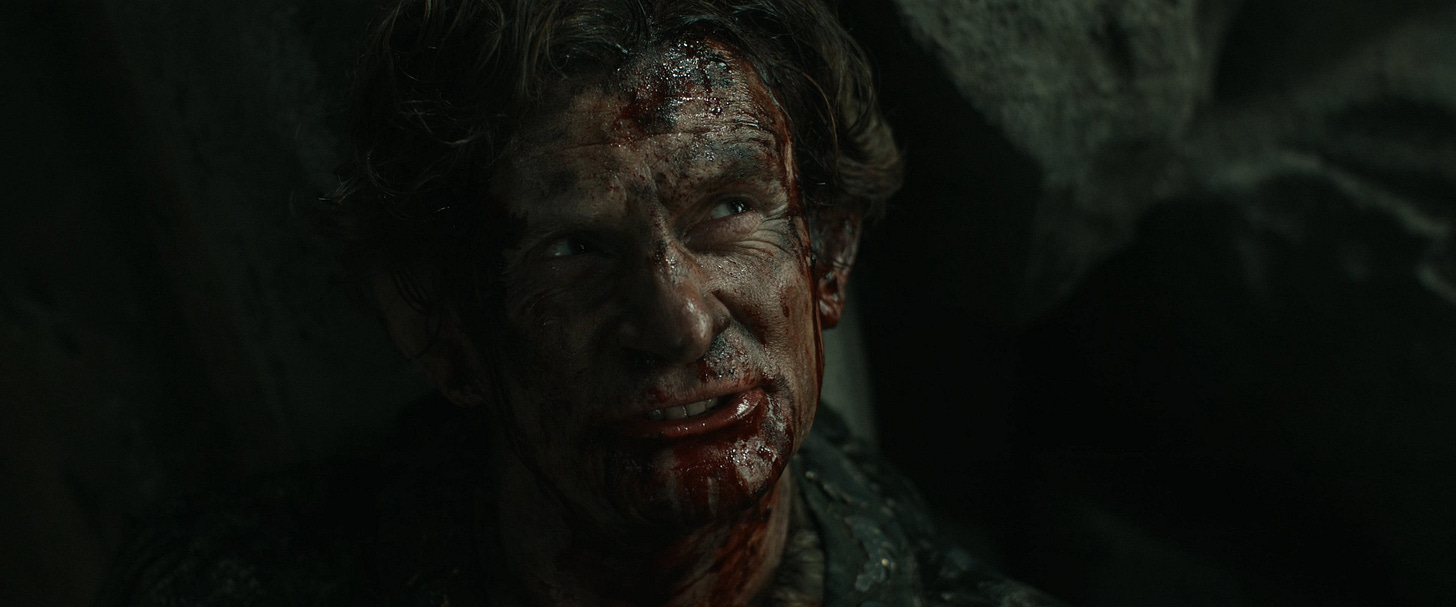
And things have gotten a lot worse. The walls of the city have been breached at multiple points, and orcs are rampaging through the streets killing everyone in their path; no wonder Galadriel was trying her hardest in Episode 6 to turn aside Adar (Sam Hazeldine) from actually attacking the city. Elrond (Robert Aramayo), Gil-galad (Benjamin Walker) and Arondir5 (Ismael Cruz Cordova) are alive, but Elrond in particular probably wishes he was dead as the orcs destroy priceless works of art and burn an entire Library of Alexandria’s worth of Elven knowledge and he can only watch at knifepoint. And what of the builder of this city and the author of this knowledge? He’s currently in his workshop being turned into a pincushion as Sauron takes potshots at him from very close range; Celebrimbor (Charles Edwards) offering himself up as a diversion is working in the worst possible way. But it is working. Part of Sauron is clearly enjoying this too much to think about other matters; part of him genuinely wishes that Celebrimbor would just give up, surrender the location of the Nine Rings, and help him in his quest for order and peace through strength. But in this, his darkest hour, Celebrimbor continues to show how much stronger he is than even his grandfather Feanor. He’s at peace with his coming end, he has regained mastery of himself, and with the eyes of death he can see things about Sauron that the latter can’t. He gets in not one, but two, prophesies that pierce Sauron’s emotional armor; by now you’ve probably heard about how he foretells that one Ring will be his ruin, but he also foreshadows how his defeat will be sealed by a great wind from the West. It’s enough to pierce Sauron’s emotional armor, and this master of control completely loses his own, running Celebrimbor through with a lance in a fit of black anger. Thus passes the greatest of all Elven smiths, yet he has still triumphed; Sauron has won, but his victory is hollow and lays him bare. And this is not the last time he’ll only win a partial victory this episode.

Celebrimbor had sacrificed himself to give Galadriel time to get the Nine Rings out of the fallen city and to evacuate as many civilians as she could; and in her first scene in this episode, we see her doing just that, cutting down multiple orcs to shepherd a group of Elven women and children to the safety of an old dwarf tunnel that leads outside the city.6 Things get a bit dicey when, at the other end of the tunnel, a rabble of orcs is waiting; Galadriel takes another one of her calculated risks and surrenders herself and the Nine to allow her charges to escape. Thankfully with no chains or blades at her throat this time, she is brought before Adar and, making explicit what had only been implicit in Episode 6, agrees to work with him to destroy Sauron if he will call off his army and spare what’s left of the city. It’s then that things get…very strange. Galadriel learns, as we learned last episode, that Adar has her Ring; but then she and we learn that it’s actually had a salubrious effect upon Adar, as this Elf who has been living a nightmare of orkishness for centuries turns and shows himself…purer, cleaner, fairer. And it’s not just a physical transformation either, as Adar voluntarily takes off Nenya and gives it to her, forgives her for all the orcs she’s slain in the past, and vows to never again trouble Middle-earth once Sauron is gone. Has Nenya healed his soul and “what is left of his heart”, even as the physical transformation wears off? It would seem so. But he still speaks of Nenya itself being used to vanquish Sauron, despite knowing on his own body that it is a tool for healing. And this entire scene is shot with copious Dutch angles, and as Dr. Maggie Parke of Rings and Realms will tell you, that means something is off.
Things finally do clear up in a moment…in the worst possible way. A group of orcs arrive bearing Captain Glug (Robert Strange) on a litter, saying that they had run into Sauron who had subsequently hurt Glug when he wouldn’t betray Adar. Part of this is true; Glug and an orc platoon had run into Sauron mere moments after he had killed Celebrimbor. But the actual outcome of that meeting becomes apparent in a few moments as Glug suddenly draws a hidden blade and stabs Adar. In a few moments, we have almost an exact replay of Sauron’s assassination in the premiere, only this time it is Adar who is surrounded by a mob of frenzied orcs stabbing him to bits. Already Glug and his comrades were being primed to fear and distrust Adar, as he plunged into his destructive war against the warnings of Galadriel and Elrond; all it apparently took was one word from the right person. And Sauron had given that word. Galadriel can only watch, frozen in horror, as Sauron slithers into the scene wearing a smug smile and a brand-new cuirass engraved with twined serpents7. This is exactly the nightmare scenario she had been so afraid of, and why she had consented to serve under Elrond’s command for her mission to Eregion despite the demotion and his bad attitude: at all costs she did not want to face Sauron alone. And yet, here we are. Flight would probably have been the best option…but this is Sauron the Shapeshifter, flight would probably only delay the inevitable. And they’re on a mountaintop; where could she get to in time? Honestly, her only chance was to at least try to fight her way out, which she does.
Try, that is. It should not have been a contest; Sauron is a Maia, he’s much bigger than Galadriel, and Adar’s sword that he appropriates is much bigger than her own Elvish saber; plus he has Morgoth’s crown, which is basically a three-bladed dagger. But she is Galadriel, after all: Nerwen the Man-maiden, “of Amazon disposition.” And the ensuing fight lasts longer than it probably would have if she had been anyone else. At one point, she even has him on the ropes for a few precious moments, so he has to resort to shapeshifting to try and get some breathing room. In the space of just a few minutes Galadriel fights Halbrand, Celebrimbor, even herself, as Sauron preys upon their past and her own lingering doubts and fears. It ultimately buys him some space but not the fight, for as he mocks her that her mind is still wide open, she tells him in no uncertain terms, “The door is shut!”8 before bodily kicking him back several feet. But in the end there can only really be one outcome, and she’s forced with her back to a rock…at which point Sauron drives Morgoth’s crown deep into her chest. And he keeps pushing it in deeper, taunting her about how he could have made her queen of the world. It is brutal to watch. Yet even in unspeakable agony, she still finds some strength, whimpering, “The free peoples of Middle-earth will always resist you!” And almost on queue, rams’ horns blare from the city down below, and the orcs there start dropping like flies under a hail of dwarvish crossbow bolts. Durin has finally come, or at least Narvi, while the prince grieves. It’s too late for the city, but at least the Elves have a fighting chance to escape.
That’s what’s going on in the city down below, but on the mountaintop overlooking it Galadriel is still in deadly peril. Nenya alone is keeping her together as Sauron finally yanks the crown from her bosom and she flops helplessly to the ground. Sauron has her at his mercy, and he also has the Nine, dislodged from her buff-coat as she first fell. But the Nine are mere trinkets compared to Nenya itself, to say nothing of its bearer. And in his pride, he decides to show his gravely wounded enemy some magnanimity and, instead of bodily yanking Nenya from her finger, offers her the chance to give it to him freely. And it is here that Galadriel proves the worth of what she’d assured Gil-galad back in Episode 2: “He knows my mind—and I know his.” She does remove Nenya and holds it out to Sauron. At last, he’s won. But before he can touch it, she asks “You wish to heal Middle-earth?” His smile of victory is honestly a thing of beauty. But even more beautiful is her followup: “Heal yourself!” And then, following the example of Elrond back in Episode 1, she throws herself off the mountaintop as he desperately grabs for Nenya. Even in the hour of victory, Sauron is robbed of the full, overwhelming triumph he was hoping for. Not even Feanor’s hammer, nor casually murdering Glug when he suggests the Orcs retreat in the face of the Dwarves’ attack, are quite enough to console him for Galadriel resisting his temptation and keeping her soul. Again.
But at what cost? Nenya probably helped Galadriel survive the fall, but when she finally hit the ground it went flying into the brush at the base of the cliff. When Gil-galad and Arondir find her, she’s in a bad way, battered and bruised and with the wounds inflicted by Morgoth’s crown festering and literally smoking with dark powers. Gil-galad does his best, helped by the fact that he had been unobtrusively wearing Vilya this whole time; now he reveals it and calls upon all his power to save Galadriel, but it’s barely enough to stabilize her. And it is here that Galadriel wins one last victory, this time against Elrond’s hard heart. To be sure, we saw that it was softening back in Episode 7, as he asked forgiveness and gave her a kiss, a lockpick, and hope. But although he now loves Galadriel again, does he trust her, or the Rings that he has spent the entire season complaining about? Sure, he had been wearing Nenya around his neck when Adar took it, but that may have been more in memory of his friend than out of trust in her. And to his eternal credit…Elrond chooses to finally heed the advice of Cirdan back in Episode 2, and to trust in the purity of the Three Rings and the innate goodness of his friend who was their champion. He retrieves Nenya, puts it on his own finger, and (not for the last time) gets to work calling somebody back from the shadow.
He doesn’t keep it, of course. A clear sign of the goodness of the Three is how easily they can be given up, how they do not hold a death grip on somebody the way King Durin’s ring did until the very end. We saw this with Galadriel herself in Episode 4, with Adar in this episode, and we see it once more in Elrond. For his and Gil-galad’s ministry works, and Galadriel’s body and life are saved. When next we see her she is resting comfortably in a peaceful valley, with Gil-galad keeping vigil and making snarky comments about how she has never been more agreeable company than when she was asleep. Alas for the king, she’s awake now, and ready to receive a visit from Elrond. Forget about the kiss in Episode 7, this time he gives her a diamond ring (technically adamant, I suppose); more importantly, he has his summer kindness once more, and the old dear friends are friends ones more. Arondir joins them; he may be a Silvan Elf far from home, but that doesn’t matter to his new Noldorin friends with whom he has shared so much. Now an informal council of war is held, for Sauron’s Great Heathen Army is now sweeping across Eriador and has probably cut them off from Lindon. Should they try to attack him now with what limited and demoralized forces are on hand, or should they harden their own defenses until they are ready?
All eyes turn to Galadriel; how far we’ve come even from the premiere of Season 2, when Gil-galad was still keeping her on something of a leash! And how far has she come from Season 1, where the perceptive “Halbrand” called her a colt meeting every obstacle with a charge at full gallop. Her resolve remains unshaken, her commitment to the task as firm as when she jumped from that ship so long ago. But her counsel now is what Celebrimbor had said last episode, that it is not strength that overcomes darkness, but light. Strength is still important, and it is important to be strong; but not to meet darkness with darkness, but to “look for the light” and once you’ve found it to never let it go. Galadriel’s path to find the light has sometimes gone very crooked, and sometimes she’s made mistakes. But having found the light in Season 1, at the end of Season 2 she has kept it. More than that, she has proved to others that the light is real and can be reached. “The Sun Yet Shines,” after all. And although the clouds of war and dominance are spreading across Middle-earth, the Elves who passed through the valley of the shadow are newly resolved to seek the light, and to do it together. As Gil-galad raises his sword in benediction over the cheering refugees9, flanked by Arondir, Galadriel and Elrond, we know that the fight is only just beginning, and that our heroes are well-ready to continue the struggle. And we have much to look forward to as it continues in Season 3, whenever it comes.
All images ©2024, Amazon Studios, unless otherwise indicated.
For Further Reference
Anthony Breznican, “The Rings of Power Season Two Finale Explained”
Felicia Day, “Inside The Rings of Power S2, E8”
Aaron Earls, “‘The Rings of Power’ Shines Brightly in Finale”
Mike Fleming, “‘Lord Of The Rings: Rings Of Power’ Season 2 Finale Q&A: Shocking Deaths, Betrayals & Sauron’s Rise To Rule Middle-earth”
James Hibbard, “‘The Rings of Power’ Creators on That Big Season 2 Finale Reveal and Sauron’s Mistake”
Jolkien with Tolkien, "‘Shadow and Flame’ Provides Epic Conclusions and Promises New Beginnings in The Rings of Power Season 2 Finale”
Nerd of the Rings, “Rings of Power Season 2 Finale Breakdown”
Aidan Pocock, “Rings of Power Season 2 Discussion: Episode 8, Shadow and Flame”
Father Roderick, “Rings of Power Season 2 Episode 8 Breakdown & Biblical Easter Eggs”
Rotem Rustak, “Sam Hazeldine Tells Us Everything There is to Know About Adar on the Rings of Power: Past, Present and Future”
Tea with Tolkien, “Episode 8/Finale: The Rings of Power Season 2 Breakdown and Reaction”
Thank you for reading The Tales That Really Matter. Please feel free to check out our Facebook, Instagram, Threads and Substack Notes profiles as well, that way we can continue to grow and reach more minds and hearts 😊
It has been an eternal debate in the Tolkien fandom whether Balrogs actually do have wings. The show has settled on depicting this one as wreathed in smoke that looks like wings, but are not functional; he has a tendency to loose his footing and needs to physically climb the rock face to get at the Dwarves.
This is the second time Anarion has been mentioned; the first was in Season 1 Episode 3, when he was something of a black sheep and cause of friction between Elendil and Isildur. In stark contrast to the Peter Jackson movies, which essentially wrote him out of the history, he exists in this telling, and will almost certainly appear in Season 3.
This is actually not the first time we saw Narsil; in Season 1 Episode 4, it was one of many First Age treasures that Galadriel and Miriel passed on the way to see the Palantir. Director Wayne Che Yip confirmed that a longsword in a white scabbard, with a hilt that closely resembled Narsil/Anduril’s from the movies, was indeed Narsil in an interview with Tolkien influencer Nerd of the Rings.
This is in keeping with Gandalf’s tendency to pick up names that other people give him; of the list of his names that he gives in The Two Towers, only Olorin is his original one from Valinor. And indeed, when the Istari first appeared in Middle-earth, they were initially seen as older Elves. It’s a bit clumsy but it works; and since the Dark Wizard will probably feature in Season 3, there’s still time for him to be called Olorin.
There remains some confusion about just how that is possible, owing to how it looked like Adar ran him through the body with his sword. Personally I don’t think that happened. Arondir didn’t start bleeding out of his mouth when that happened, and when Adar stalked away his sword didn’t have any red on it; and as this episode shows us, it’s not afraid of showing that Elves bleed. I’m guessing that Adar simply clubbed him to the ground before moving on.
Strong shades of her own second cousin Idril, who in the 1917 version of The Fall of Gondolin donned a coat of mail and sword and fought to protect her son Earendil and to hold open the way to a secret tunnel she and her husband Tuor had dug.
Not only does this hearken back to how Sauron turned into a serpent while trying to escape Huan, but two serpents crowned with gold is also one of the emblems of the House of Finarfin; it is currently on the ring gifted by Finrod to Barahir that is now an heirloom of the Lords of Andunie (which title Elendil is on his way to reclaim). This is some next-level trolling by Sauron; was he expecting to meet Galadriel now or just at some future date?
Thus we have the first instance, in show canon, of what Galadriel will tell Frodo in The Fellowship of the Ring: “I say to you Frodo that even as I speak to you I perceive the Dark Lord and know his mind, or all of his mind that concerns elves, and he gropes ever to see me and my thought; but still the door is closed!”
We can see here that Galadriel’s gambit earlier did pay off; two of these refugees are a mother and child who were part of the group she was getting out of the city. One of these refugees is also Vorohil (Charlie Rix), who I thought died in Episode 7 but somehow survived; and I am not displeased by that at all.






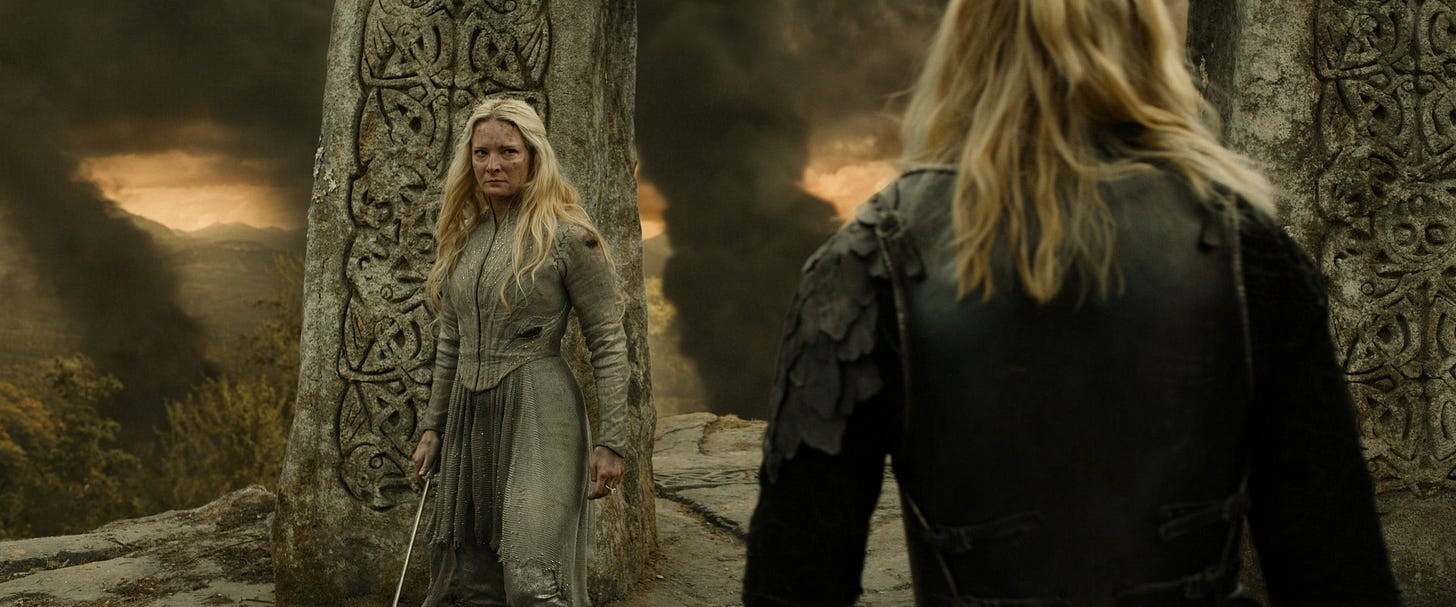

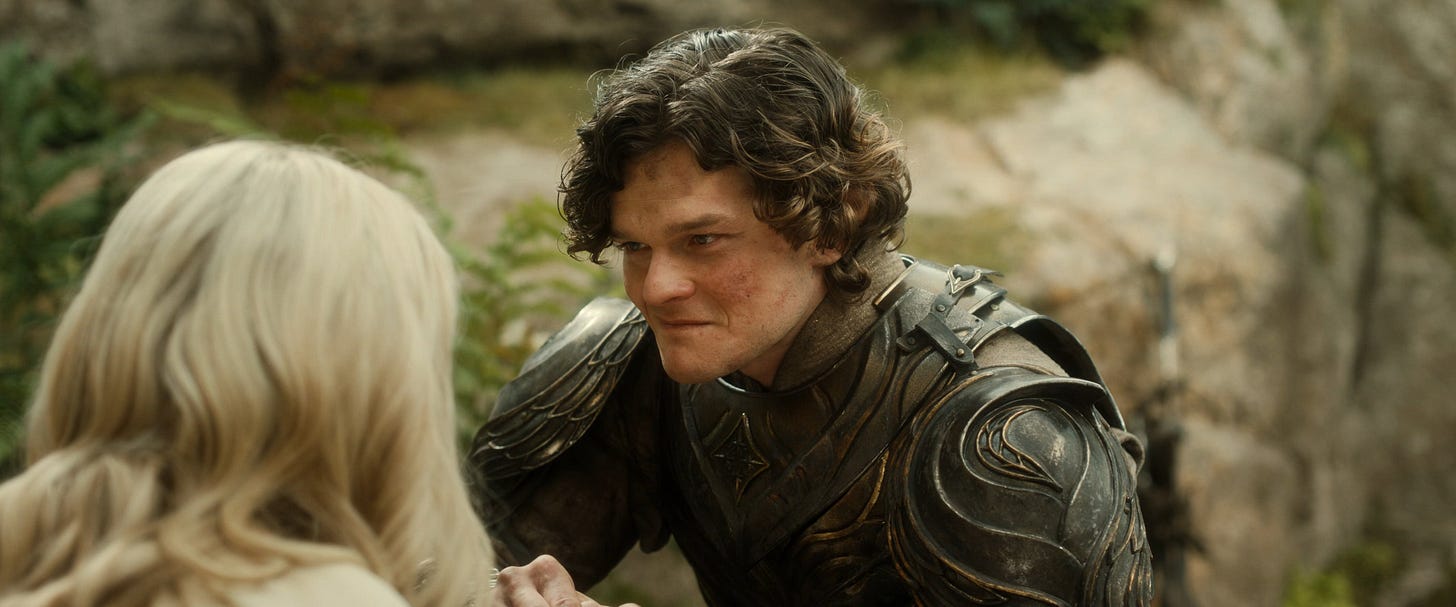

The Lord of the Rings casts a long shadow over Wellington, New Zealand and the heady days when it premiered in its director's hometown seem long ago as the city faces challenges. But one part of it still gives off Mordor vibes:
https://musingmore.substack.com/p/more-musings-capital-city-blues-and